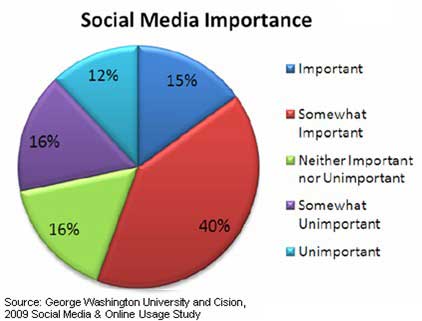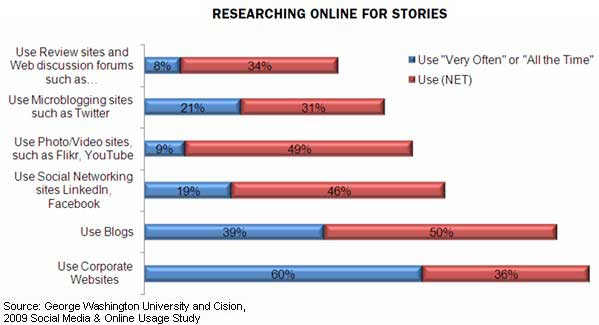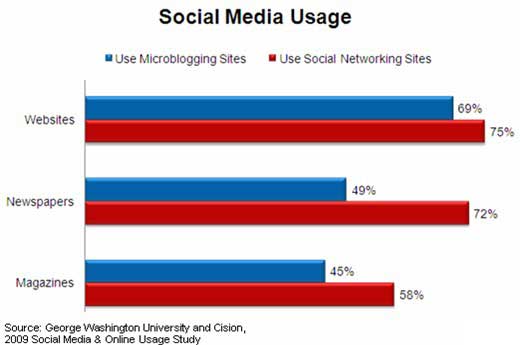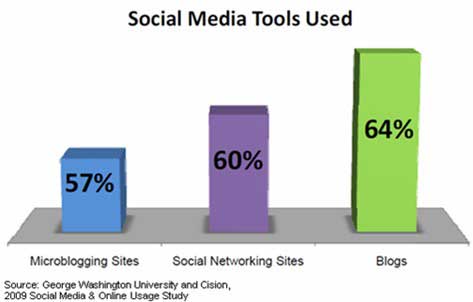Most editors and reporters depend on social media as a source: 55% of print and Web journalists say social media is important or somewhat important for reporting and producing the stories they write, according to a survey conducted by George Washington University and Cision.

The groups that place the highest levels of importance on social media for reporting and producing stories are journalists who spend most of their professional time writing for websites (69%), followed by those who write for newspapers (59%), and those who write for magazines (48%).
Below, other findings from the 2009 Social Media & Online Usage Study from George Washington University and Cision.
Researching Online for Stories
Nearly nine out of ten journalists (89%) say they use blogs for online research. Only corporate websites (96%) are cited by more journalists as a source of online information.

Meanwhile nearly two-thirds (65%) of journalists turn to social networking sites like Facebook and LinkedIn as sources, while only about one-half (52%) make use of microblogging sites such as Twitter.
Journalists who write predominantly for newspapers and websites rely on social media more than those who write for magazines: 72% of newspaper journalists and 75% of Web journalists use social networking sites such as LinkedIn and Facebook for online research, significantly more than those who write for magazines (58%).

Looking for real, hard data that can help you match social media tools and tactics to your marketing goals? The State of Social Media Marketing, a 240-page original research report from MarketingProfs, gives you the inside scoop on how 5,140 marketing pros are using social media to create winning campaigns, measure ROI, and reach audiences in new and exciting ways.
Producing Stories
Blogs (64%) are the most frequently used social networking tool to publish, promote, and distribute what journalists write, followed closely by social networking sites (60%), and microblogging sites (57%).

Measuring Story Impact
When measuring the impact of stories published on social networking sites or the Internet, most journalists rely on standard Web metrics:
- Number of website visitors: 76%
- Comments or views: 74%
- Twitter followers: 43%
- Inbound links: 43%
Reliability is a Major Concern
Despite wide adoption of social media as a resource for journalists, reporters and editors are concerned about its reliability: Compared with traditional media, 54% say, social media sources are "much less reliable," 31% say they are "slightly less reliable," and only 13% say they are about as reliable as traditional media.
Website reporters have slightly more trust in social media: 76% of Web journalists say that social media sources are less reliable than traditional media, compared with those from print media––including whereas 91% of newspaper journalists and 85% of magazine journalists––who say social media is less reliable than traditional media as a source for reporting.
Nearly one-half (49%) of journalists cite the lack of fact-checking, verification, or reporting standards as the reason for their perceptions regarding the question of reliability, and 25% cite source-related issues.
Use of Search Engines
Google is the top search engine used by journalists for online research: 100% of journalists use Google, followed by Wikipedia (61%), Firefox (31%), Yahoo (26%), MSN/Bing (15%), and Ask (7%).
Journalists Depend on PR Professionals for Primary Research and Context
Most journalists turn to public relations professionals for assistance with their primary research, including for the following:
- Interviews and access to sources and experts: 44%
- Answers to questions and targeted information: 23%
- Perspective, information in context, and background information: 17%
About the data: The survey was conducted by Cision and Don Bates, instructor and founding director, Strategic Public Relations Program, George Washington University Graduate School of Political Management. Results presented are based on 371 responses from editors and journalist, collected between Sept. to Oct. 13, 2009.



